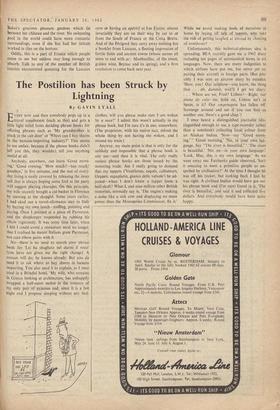Struck by The Postilion has been Lightning
By GAVIN LYALL EVERY now and then somebody pops up in a travel supplement (such as this) and gets a little light relief from deriding phrase books for offering phrases such as 'My grandmother is stuck in the cab door' or 'Where can! buy shares in the banana-importing industry?' This seems to me unfair, because if the phrase books didn't tell you this, they wouldn't tell you anything useful at all.
Anybody, anywhere, can learn 'Good morn- ing,' 'Good evening,' How much?—too muck! goodbye,' in live minutes, and the rest of every- day living is easily covered by releasing the inner self that is always hoping some fool at the party Will suggest playing charades. On this principle, my wife recently bought a cat-basket in Florence by mewing at the shopgirl. Some years earlier, I had eked out a travel-allowance stay in Italy by buying my own lunch—sniffing, pointing and Paying. Once I pointed at a piece of Parmesan, and the shopkeeper responded by rubbing his elbow vigorously. It was some time later, when I felt I could avoid a restaurant meal no longer, that I realised he meant Italians grate Parmesan, not cure elbow pains with it.
No—there is no need to search your phrase book for 'Lei ha sbagliato nel darmi ii resto' (you have not given me the right change). A scream will do; he knows already. But you do need it to ask where to buy shares in banana importing. You also need it to explain, as I once tried in a Brindisi hotel, 'My wife, who remains in Greece looking at architecture, has unhappily wrapped a half-eaten melon in the trousers of My only pair of pyjamas and, since it is a hot night and I propose sleeping without any bed- clothes, will you please make sure I am woken by a man?' I admit this wasn't actually in my phrase book, but I'm sure it's in one, somewhere. (The proprietor, with his native tact, stived the whole thing by not having 'Tie woken, and I missed my train.) Anyway, my main point is that is only for the unlikely and impossible that a phrase book is any use—and then it is vital. The only really useless phrase books are those issued by •the motoring trade. Am I really going to demand that my tappets ('Ventilerno, Wines, culbuteurs, kleppen, supaplarin, giuoco delle valvole') be ad- justed—when I don't know a tappet from a half-shaft? What I, and nine million other British motorists, normally say is, 'The engine's making a noise like a sick cow and displaying no more power than the Monopolies Commission; fix it.' While we avoid making fools of ourselves at home by laying off talk of tappets, why take the risk of getting laughed at abroad by chatting of ventilerno?
Unfortunately, this technical-phrases idea is spreading. BEA recently gave me a 1962 diary including ten pages of aeronautical terms in six languages. Now, there are many indignities to which airlines have put me, but never yet re- pairing their aircraft in foreign parts. (But pos- sibly I was sent an aircrew diary by mistake. 'Here, you! Our tailplane—you know, the thing that . . . oh, dammit, waitil I get my diary. . . . Where are we, Fred? Lisbon?—Right, our piano de cola—no, hold, on, Lisbon isn't in Spain, is it? Our enzpenagenz has fallen off. Scrounge around and see if you can find us another one, there's a good chap.') I once heard a distinguished journalist (dis- tinguished enough to use a tape-recorder rathei than a notebook) Collecting local colour from an Alaskan Indian. `Now—say "Good morn:. ing." "Good morning.' 'No, in your own lan- guage. Say "The river is beautiful."' 'The river is beautiful."No, no—in your own langirage:', 'Look, Mac, this is my own language.' As we went away our Fairbanks guide observed, 'Isn't it amazing to meet a primitive people so un- spoiled by civilisation?' At the time I thought he was off his rocker, but looking back I feel he was right. A civilised Indian would have got out his phrase book and (I'm sure) found in it, 'The river is beautiful,' and said it and collected five dollars. And everybody would have been quite happy.






































 Previous page
Previous page